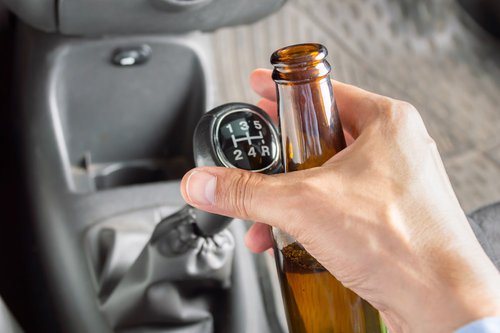What is the “Cause and Effect” of Drunk Driving?

The concept of “Cause and effect" is a critical component of everyday reasoning, and a fundamental reasoning tool used in philosophy, science, and other fields. Simply put, it describes the relationships between actions and subsequent reactions, with the action causing the reactive effect. We intuitively start learning about cause and effect at an early age, with life lessons such as finding out that touching a hot stove will burn your hand or that swatting at a bee might lead to a sting. As adults, understanding cause and effect is an essential critical thinking skill that helps us make informed decisions. By anticipating the outcomes of the actions we take, we can plan effectively to secure a desired effect and avoid unintended consequences.
Cause and effect can be multifaceted and applied at the micro and macro levels. Let's consider it in relation to drunk driving at the micro level with this fictional scenario:
Cause and Effect of Drunk Driving on an Individual Basis
Jason consumes six ales in three hours at a downtown Toronto bar while celebrating his friend's birthday, pushing his blood alcohol concentration (BAC) well above the legal 0.08% limit. When it's time to go home, he underestimates his impairment, feels confident in his driving skills, and doesn't want to spend money on alternative transportation or leave his car in overnight downtown parking. This represents the drunk driving cause.
The resultant effect is that Jason's impairment causes him to jump his car over the curb to almost clip a parking meter, dangerous driving witnessed by Toronto police. They pull him over and arrest him for drunk driving after he fails roadside alcohol screening. In court, Jason represents himself and fails to disprove the Crown's case against him, leading to a criminal conviction and its numerous negative consequences.
“ Scenarios like this play out daily in the Greater Toronto Area," says TorontoDUI founding partner Jeff Mass . “Many drivers, like the fictional Jason, consider cause and effect before driving after they've consumed alcohol, but their judgment and ability to think critically is impaired. Unfortunately, some of our DUI clients completely disregarded any consideration of cause and effect."
Jeff's co-founding TorontoDUI partner Robbie Tsang notes that the multifaceted nature of cause and effect means that the resultant effect in such scenarios is not set in stone. “If Toronto police had not witnessed the curb jump, Jason might have made it home without getting arrested," he says. “Alternatively, Jason might have clipped a pedestrian and been arrested for the more severe DUI charge of causing bodily harm. In considering another facet of effect, Jason may not have been convicted of impaired driving had he hired an experienced DUI defence lawyer."
What Causes Drunk Driving?
Jason's scenario details the basic cause of drunk driving — driving after consuming too much alcohol. And while Jason contemplated cause and effect before driving drunk, his impairment likely clouded his thinking. Despite extensive anti-drunk-driving public awareness campaigns, stringent police enforcement, and the social stigma against impaired driving, thousands of Canadians drive impaired every day, with police arresting about 215 per day on average. Whether cause and effect is contemplated or not, other inherent causes of impaired driving include:
- Underestimating the effects of alcohol and falsely believing they are perfectly capable of safe driving.
- Failing to arrange for alternative transportation in advance of drinking, or a lack of viable alternative transportation options.
- Not wanting to pay for alternative transportation or wishing to keep close possession of their vehicle.
- Chronic alcohol dependency that may significantly limit possible periods of sober driving.
- A perception that DUI enforcement is weak and will allow them to evade detection.
- Social and cultural factors that normalize drinking and make alcohol consumption prevalent at a wide variety of events.
- Emotional and psychological factors that may drive someone to drink excessively and engage in poor decision-making, including driving while impaired.
- Risk-taking behaviour by younger drivers, who may drive drunk due to impulsivity, overconfidence, or a devil-may-care attitude.
Macro-Level Effects of Drunk Driving
At the macro-level, drunk driving has profound adverse effects on Canadian society, including:
- Impaired driving is a contributing factor in about 20% of all annual traffic fatalities, killing about 1,500 people and injuring another 10,000 every year.
- Those injured in drunk driving accidents overwhelm emergency rooms and trauma centers, straining healthcare budgets and shifting the focus from other medical priorities.
- Thousands of Canadian families experience long-term emotional and financial trauma due to the significant number of preventable impaired-driving deaths and injuries.
- Impaired driving costs Canadians an estimated $20 billion per year in healthcare, legal, and property damage expenses.
- Impaired driving cases clog local court systems, straining judicial resources and the effectiveness of court operations.
- DUI enforcement strains provincial and municipal budgets, diverting public funds from other needs.
Micro-Level Effects of Drunk Driving
Jason's drunk driving scenario gave you a taste of the micro-level effects of drunk driving, but let's take a closer look, starting with others. Jason's decision to drive drunk could have resulted in an accident, causing death, injuries, and/or property damage to other people. Sadly, this happens to Canadians all the time, and you certainly don't want it to happen to you or your loved ones.
As for Jason himself, his poor decision-making could lead to his own death, injuries, and/or property damage, which could prove more personally devastating than a DUI arrest and conviction. Under the provided scenario, his conviction still puts him in a world of hurt with legal penalties and other severe consequences.
Thus, if you've had a few drinks and are thinking about driving, conduct a cause-and-effect exercise about your drunk driving and know that, at a minimum, if you are arrested and convicted of drunk driving, you face the following consequences:
- $1,000 fine.
- One-year driver's license suspension.
- Mandatory enrollment in Ontario's “Back on Track" education/treatment program.
- Enrollment in an Ignition Interlock program.
- “High Risk" annual insurance premium increases ranging from $2,000 to $10,000, lasting up to six years.
- Minimum $281 in fees for driver's license reinstatement, plus at least another $1,600 in assorted fees.
- Permanent criminal record that can compromise employment and educational opportunities.
- Alternative transportation costs during license suspension.
- Towing and impoundment costs, if applicable.
- Potential job loss.
Don't Cause Unwanted Effects with a DUI in Toronto
With extensive experience defending clients in the Greater Toronto Area against DUI charges, we advise you not to be like the hypothetical Jason. Conduct a cause-and-effect exercise before you drive drunk and know that the effects are just not worth it. If that doesn't work, and the police arrest you for DUI, we again advise you not to be like Jason. He failed to hire an experienced DUI defence lawyer , tried to represent himself in court, and ended up with a criminal DUI conviction.
To learn more about our expertise in Canadian DUI law and how we can mount an effective defence against your DUI charges in the GTA , contact TorontoDUI for a free initial consultation.
